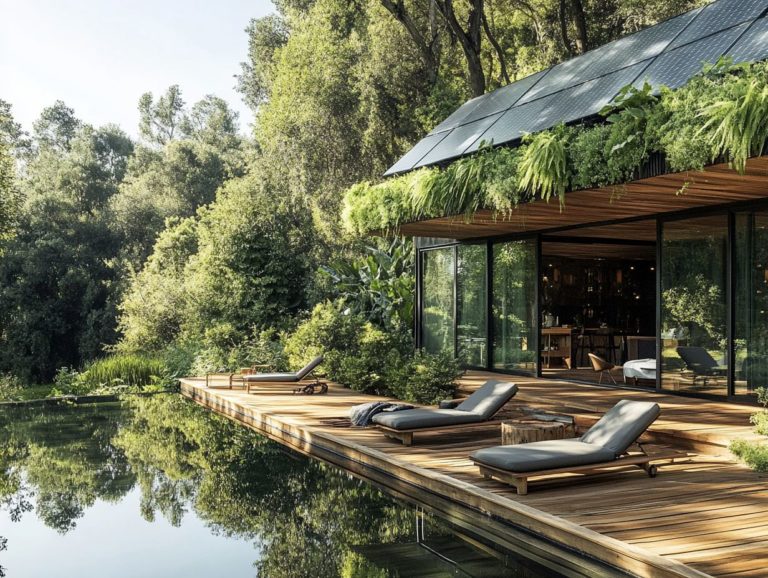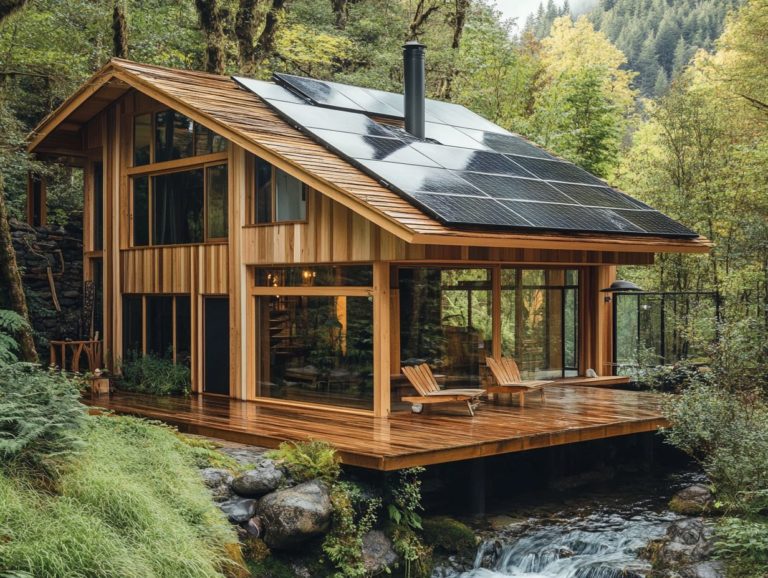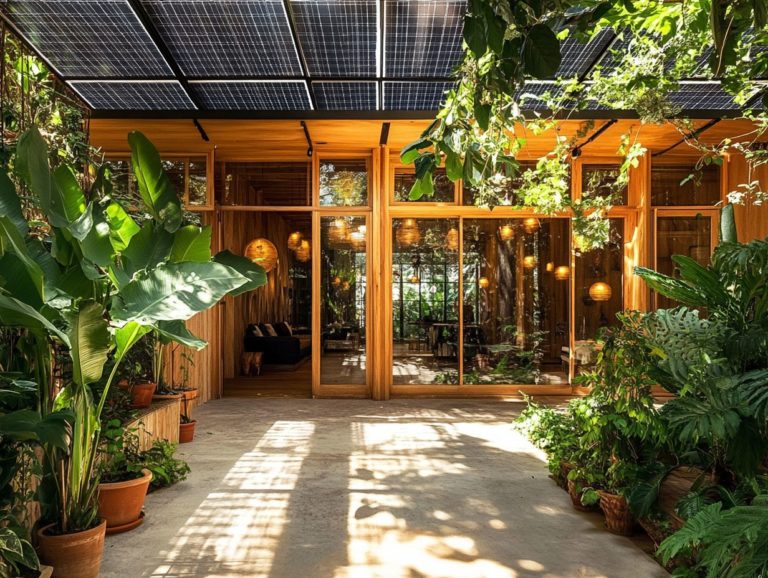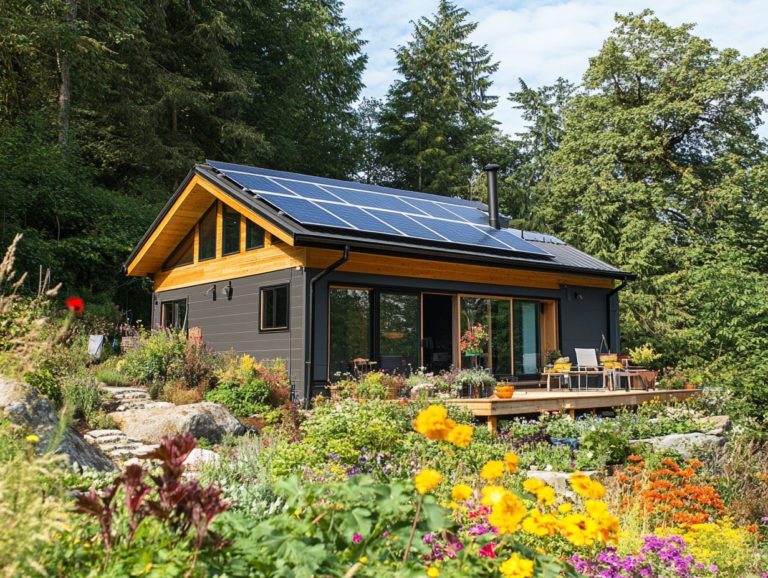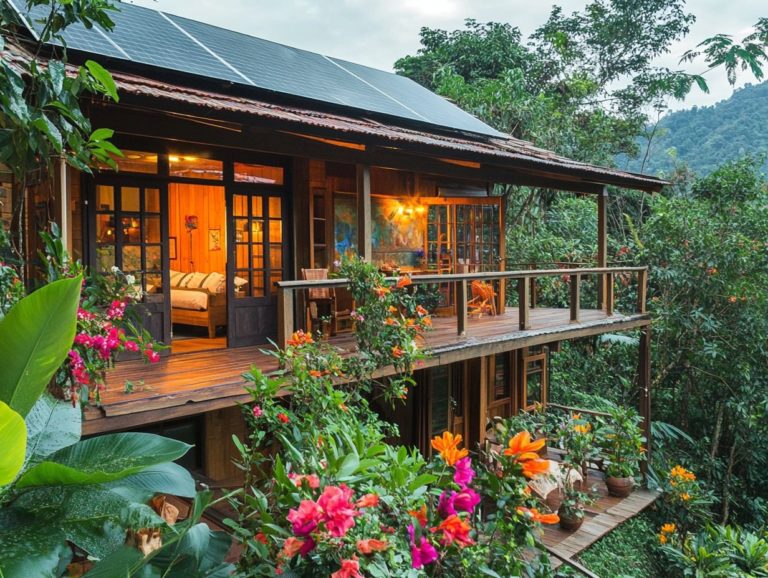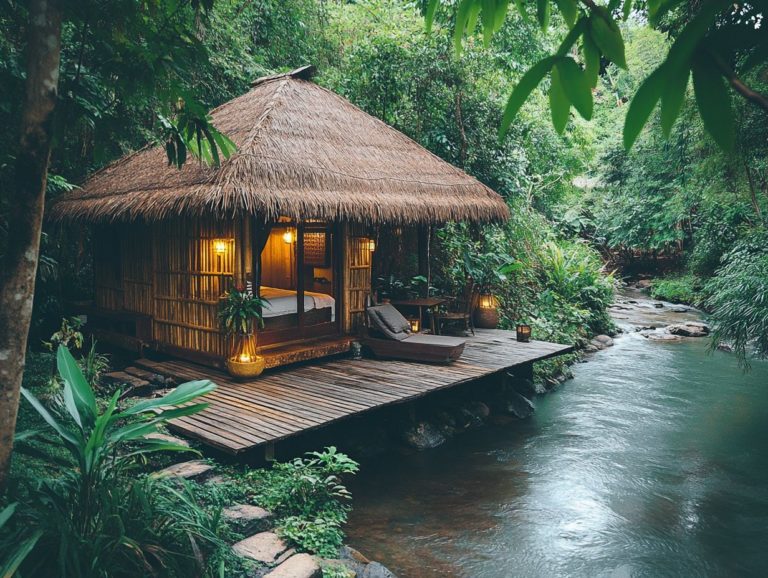Sustainable Design in Modern Hotels
In today s landscape, the hospitality industry is embracing sustainable design as an essential element of modern hotel development. This approach reflects current consumer trends and the growing pressure toward sustainability.
This article explores the concept of sustainability and its benefits for the environment, the corporate sector, and significant operational cost savings. You ll discover effective strategies for integrating environmentally friendly actions and energy efficiency into hotel architecture. We ll also cover sustainable operational practices such as waste management and water conservation.
This article shares success stories of eco-friendly hotels and the challenges they faced. It illustrates how collaboration can lead to a greener future in hospitality while emphasizing the need to combat greenwashing.
Contents
- Key Takeaways:
- Why Sustainable Design is a Game-Changer for Modern Hotels!
- Benefits of Sustainable Design in Hotels
- Incorporating Sustainable Design in Hotel Architecture
- Sustainable Design in Hotel Operations
- Waste Management
- Water Conservation
- Examples of Sustainable Hotels
- Case Studies of Successful Sustainable Hotels
- Challenges and Solutions in Implementing Sustainable Design in Hotels
- Frequently Asked Questions
- Curious about sustainable design in modern hotels?
- Why does sustainable design matter in modern hotels?
- What are some examples of sustainable design features in modern hotels?
- How do hotels incorporate sustainable design in their operations?
- What benefits do guests experience from staying in a sustainably designed hotel?
- How can you support sustainable design in modern hotels?
Key Takeaways:
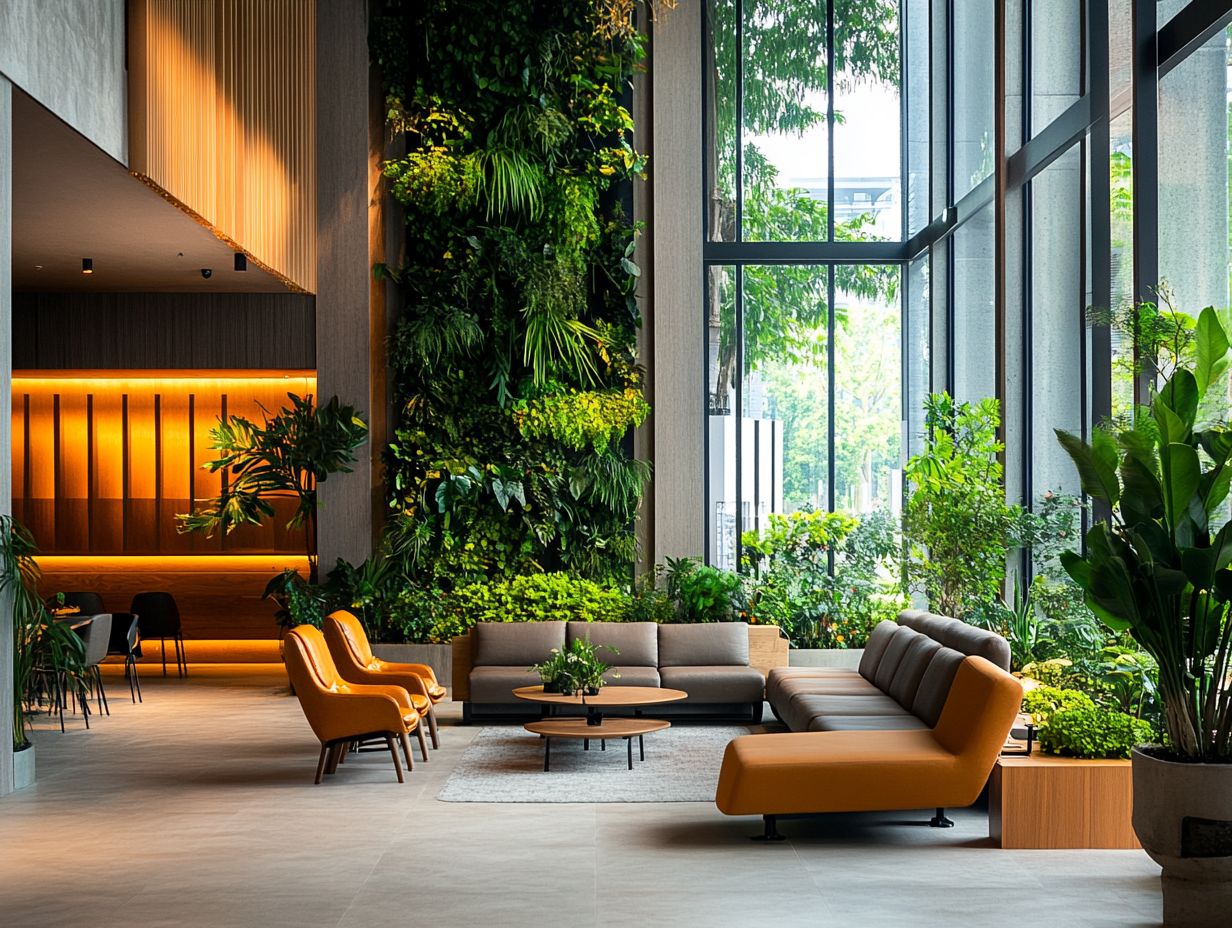
- Embrace sustainable design to drastically cut your environmental impact and save money!
- Implement sustainable design principles in hotel architecture and operations to achieve energy efficiency and reduce waste.
- Collaboration with suppliers and guests is key to overcoming challenges and successfully implementing green initiatives in hotels.
Why Sustainable Design is a Game-Changer for Modern Hotels!
Sustainable design in modern hotels minimizes environmental impact while enhancing the guest experience. By incorporating environmentally friendly actions into hospitality, you cater to a rising demographic of eco-conscious travelers.
As consumer demand for sustainability continues to grow, luxury hotels must act now to prioritize energy efficiency and resource management. This not only reduces their carbon footprint but also positions them favorably with consumers who increasingly favor sustainable brands.
Understanding the Concept of Sustainability
Sustainability involves practices that satisfy present needs without jeopardizing future generations’ ability to fulfill their own. It emphasizes responsible resource management and eco-friendly initiatives to combat climate change.
This multifaceted principle focuses on environmental conservation, social equity, and economic viability. In hospitality, sustainability translates to implementing green practices like reducing energy consumption, minimizing waste, and promoting local sourcing.
Establishments that champion eco-friendly measures, such as harnessing renewable energy sources and enhancing water efficiency, play a vital role in creating a sustainable future. By aligning operations with environmental policies, hotels and restaurants cultivate a culture of responsibility while attracting an increasingly eco-conscious clientele.
Benefits of Sustainable Design in Hotels
Sustainable design in hotels provides numerous advantages. It significantly lowers environmental impact and carbon emissions, leading to substantial cost savings and enhanced guest experiences that resonate with today s discerning travelers.
Environmental Impact
The environmental impact of hotels can be significant, as their operations contribute considerably to carbon footprints and waste generation. Adopting sustainable tourism practices is essential for minimizing ecological damage.
To tackle these urgent issues, many hotels are re-evaluating their waste management strategies. They are implementing recycling programs and reducing single-use items. The importance of natural lighting cannot be overstated; optimizing daylight in guest rooms enhances the visitor experience and reduces reliance on artificial lighting, lowering energy consumption.
By focusing on these initiatives, the hotel industry can effectively reduce its ecological footprint while promoting sustainable tourism. This ensures that travelers enjoy luxury while witnessing a commitment to preserving the environment for future generations.
Cost Savings
Implementing sustainable design in hotels doesn t just benefit the environment; it can lead to significant cost savings through enhanced energy efficiency, resource management, and effective waste diversion strategies.
By embracing energy-saving tools like LED lighting and smart thermostats, you ll notice a remarkable reduction in your utility bills, which directly impacts your bottom line. Improved water management systems can further minimize waste, resulting in additional savings on those pesky utility costs.
These eco-friendly practices attract travelers who care about the environment, boosting your occupancy rates and strengthening customer loyalty.
When you prioritize green initiatives, you re optimizing operational costs and positioning your hotel favorably in a competitive market. Sustainability isn’t just a trend it’s a smart move that can save you money and attract more guests!
Incorporating Sustainable Design in Hotel Architecture
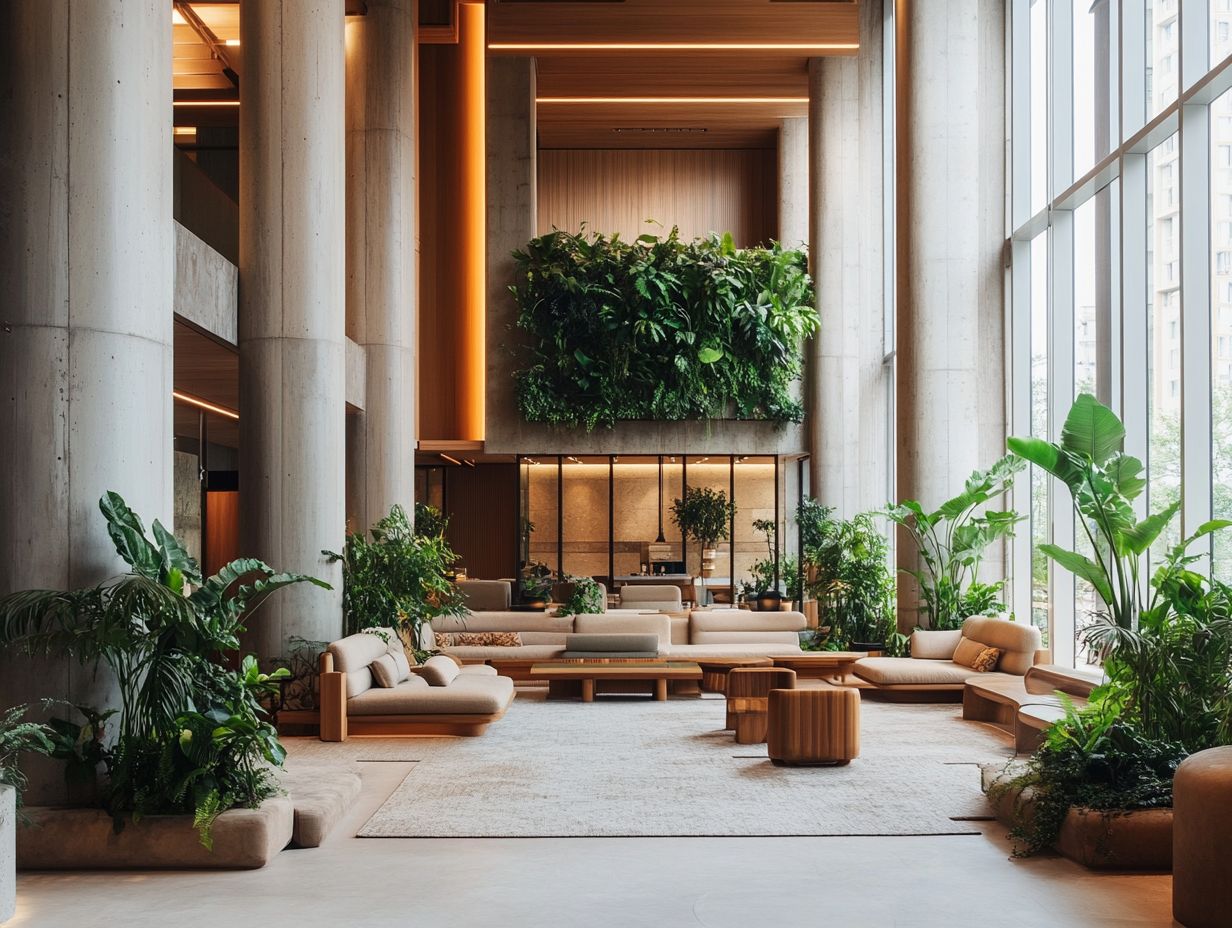
Incorporating sustainable design into hotel architecture means embracing green building practices and selecting sustainable materials. This approach not only elevates the aesthetic allure of luxury hotels but also champions adaptive reuse and fosters responsible hotel operations.
By prioritizing sustainability, you enhance the overall experience while positively contributing to the environment and community.
Green Building Practices
Green building practices in the hospitality industry emphasize sustainable materials and energy efficiency measures that align with environmental policies. This can lead to coveted certifications like LEED (Leadership in Energy and Environmental Design).
These practices reduce the ecological footprint of hotel operations and elevate the overall guest experience. By opting for locally sourced materials and integrating advanced water-saving technologies, you save important resources and create a healthier space for your guests.
Embracing renewable energy solutions, such as solar panels and geothermal heating, shows a strong commitment to sustainability that resonates with many environmentally conscious travelers. Achieving recognized certifications reinforces your hotel’s dedication to green practices and attracts clientele that prioritizes sustainability, ultimately enhancing your hotel’s reputation in a competitive market.
Energy Efficiency Strategies
Energy efficiency strategies in hotels, particularly the adoption of smart technology and renewable energy sources, play a vital role in reducing carbon emissions and operational costs.
By integrating advanced energy management systems, you can monitor consumption in real-time, enabling timely adjustments that enhance sustainability. When you adopt renewable energy applications like solar panels or wind turbines, you reduce your reliance on traditional power grids and demonstrate a strong commitment to green practices.
You ll find that energy-efficient lighting, smart thermostats in HVAC systems, and occupancy sensors help optimize resource use, ultimately leading to substantial savings. This means the hospitality sector meets the growing customer demand for eco-friendly practices while actively contributing to the fight against climate change.
Sustainable Design in Hotel Operations
Sustainable design in hotel operations goes far beyond just the architecture; it also includes effective waste management and water conservation strategies. By integrating eco-friendly practices into every aspect of guest services, you ensure that sustainability is a fundamental principle guiding your operations.
Start implementing these sustainable practices today to transform your hotel and attract guests who value eco-friendliness!
Waste Management
Effective waste management strategies in hotels, including waste diversion and recycling initiatives, are essential for sustainable practices. These strategies align seamlessly with environmental policies designed to reduce waste generation.
By adopting systematic approaches, such as composting organic materials and inviting guests to engage in recycling programs, you can significantly lessen the environmental footprint of your establishment. Educating your staff on efficient waste sorting techniques and utilizing technology to monitor waste streams enhances operational efficiency.
These practices contribute to your corporation s broader sustainability goals and elevate your hotel’s reputation among environmentally conscious travelers. Embracing holistic waste management strategies conserves valuable resources and fosters a positive impact on local communities and ecosystems.
Water Conservation
Water conservation is a vital eco-friendly practice in hotels. Implementing sustainable options like low-flow fixtures and water-efficient landscaping can significantly minimize water usage.
This commitment reduces operational costs for hotel management and helps preserve our precious water resources, fostering a healthier environment. By embracing strategies like rainwater harvesting and reusing water from sinks and showers, hotels can enhance their sustainability efforts while attracting eco-conscious travelers, including those interested in understanding green roofs in hotels.
Educating both staff and guests about the importance of water conservation cultivates a sense of shared responsibility, leading to a meaningful impact on the local ecosystem. Hotels that integrate these water-saving initiatives often enjoy positive public relations and heightened guest loyalty, translating into long-term economic benefits.
Examples of Sustainable Hotels
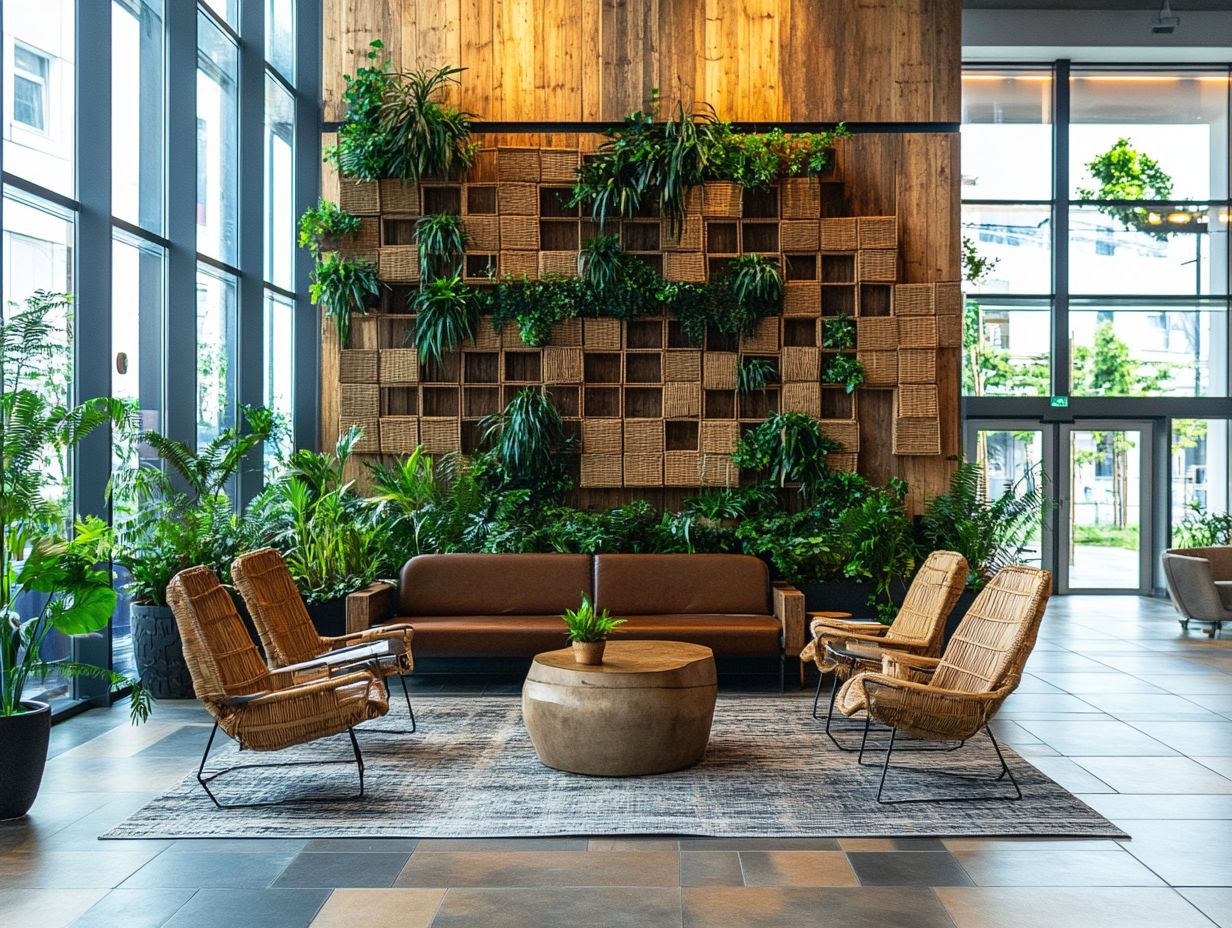
Examples of sustainable hotels serve as compelling case studies, showcasing eco-friendly practices and green initiatives within the luxury hotel sector.
They illustrate the remarkable potential for environmental responsibility in hospitality, proving that luxury and sustainability can coexist harmoniously.
Case Studies of Successful Sustainable Hotels
Case studies of successful sustainable hotels reveal innovative approaches to eco-friendly practices. You can enjoy luxury experiences while remaining environmentally responsible.
These establishments exemplify strategies, ranging from harnessing renewable energy sources to integrating locally sourced materials into their design. For instance, some luxury resorts grow on-site organic gardens, providing fresh produce while supporting local farmers.
Incorporating sustainable technologies like rainwater harvesting systems and advanced waste management practices not only enhances your experience but fosters a meaningful connection to the local environment. By marrying opulence with sustainability, these hotels showcase the rise of sustainable boutique hotels that set a new benchmark in travel, resonating with eco-conscious consumers and marking a significant transformation in the hospitality landscape.
Challenges and Solutions in Implementing Sustainable Design in Hotels
Implementing sustainable design in hotels presents challenges, including resistance within the corporate sector and ever-changing consumer trends. You must think creatively and develop innovative solutions to overcome these barriers and encourage eco-friendly practices throughout the industry.
Join the movement towards sustainability in your hotel today!
Overcoming Obstacles
Overcoming obstacles in sustainable design demands your commitment to environmentally friendly practices and a readiness to innovate within the hotel industry. This approach allows you to effectively address both internal and external challenges.
Internally, you may face budget constraints. Many hotels find it tough to prioritize sustainability initiatives over immediate profits.
On the external front, pressures like regulatory compliance and the diverse preferences of guests can complicate your efforts.
To navigate these challenges, focus on integrating energy-efficient systems, such as smart lighting and modern heating and cooling systems. These solutions not only help reduce costs in the long run but also enhance the guest experience.
Forming partnerships with sustainability experts can provide valuable guidance. This ensures that your hotel remains competitive while showcasing a genuine commitment to sustainable practices. This approach can earn you customer loyalty and bolster your brand’s positive reputation.
Collaborating with Suppliers and Guests
Collaborating with suppliers and guests is crucial for successfully implementing sustainable design in your hotel. This fosters eco-friendly practices that elevate overall guest satisfaction.
This partnership allows you to adopt a holistic approach to sustainability, where every aspect of the hotel experience is infused with environmentally conscious choices.
By engaging with suppliers who prioritize sustainable materials and practices, you can significantly reduce your carbon footprint while still offering high-quality amenities, aligning with the future of sustainable accommodations.
Involving guests in sustainability initiatives like promoting zero-waste habits or sourcing local produce helps cultivate a community-focused mindset. Together, these efforts enhance service standards and instill a shared sense of responsibility toward the environment, ultimately leading to a more sustainable hospitality industry.
Frequently Asked Questions
Curious about sustainable design in modern hotels?
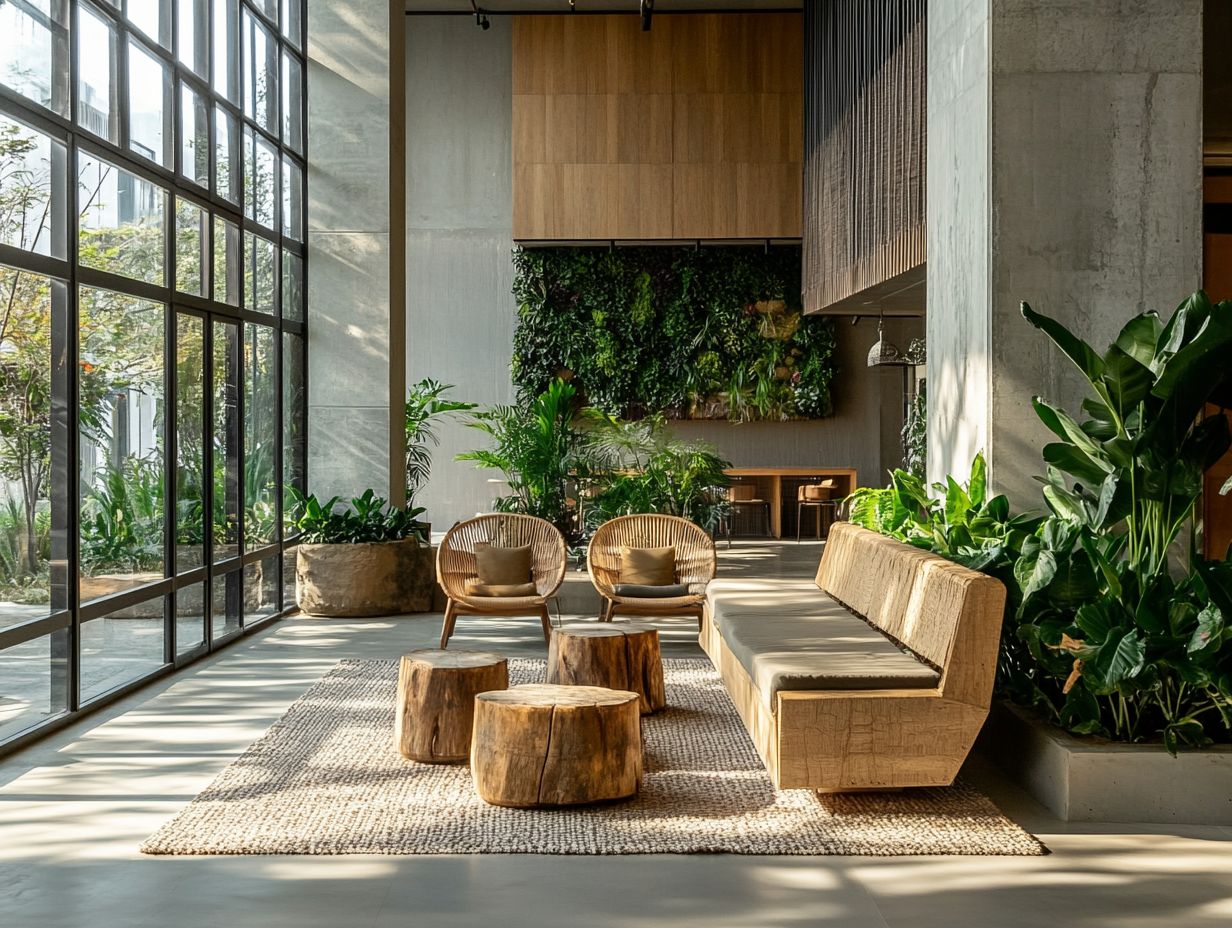
Sustainable design in modern hotels refers to a design approach that aims to reduce negative environmental impacts while promoting sustainable practices in the operation and construction of hotels. Consider harnessing renewable energy sources, incorporating eco-friendly materials, and implementing efficient water and waste management systems.
Why does sustainable design matter in modern hotels?
Sustainable design matters because it minimizes the carbon footprint and environmental impact of the hospitality industry. It also helps reduce operational costs and attract environmentally conscious guests, leading to a more sustainable and profitable business.
What are some examples of sustainable design features in modern hotels?
Examples of sustainable design features include using energy-efficient lighting and appliances, installing low-flow toilets and faucets, incorporating natural lighting and ventilation, and using recycled or locally sourced materials in construction and furnishing.
How do hotels incorporate sustainable design in their operations?
Hotels can incorporate sustainable design by implementing eco-friendly practices such as reducing energy and water consumption, promoting recycling and waste reduction, and sourcing locally grown or organic food for their restaurants. Partnering with suppliers who practice sustainability is also beneficial.
What benefits do guests experience from staying in a sustainably designed hotel?
Guests can enjoy a healthier and more environmentally friendly environment, reduced noise pollution, and the satisfaction of supporting a sustainable business. They may also have access to eco-friendly amenities and activities, such as bike rentals and organic spa treatments.
How can you support sustainable design in modern hotels?
You can make a difference by choosing eco-friendly properties, participating in sustainable activities offered by the hotel, and being mindful of your energy and water usage during your stay. Providing feedback on sustainability efforts can also help improve practices further.
Join the movement toward sustainability choose eco-friendly hotels for your next stay!

